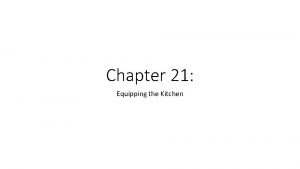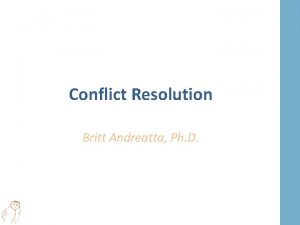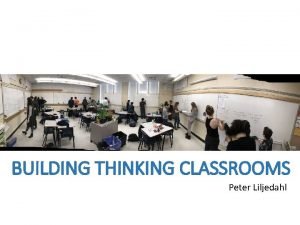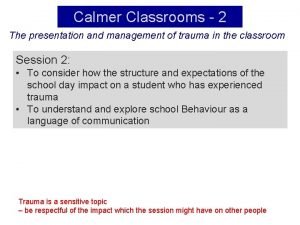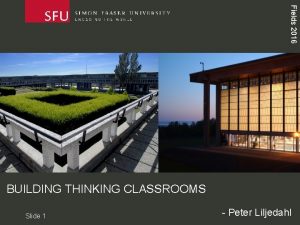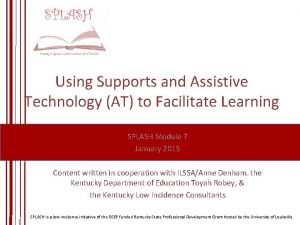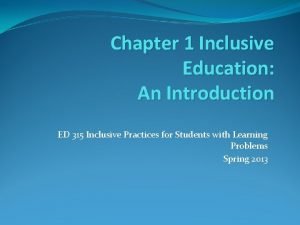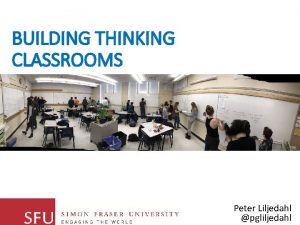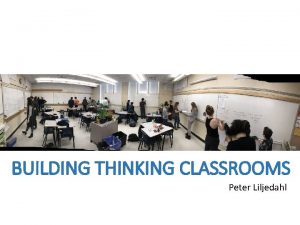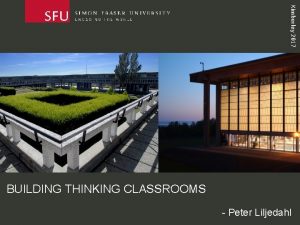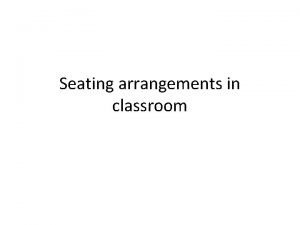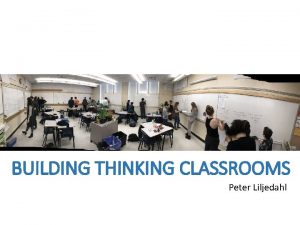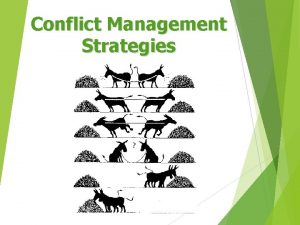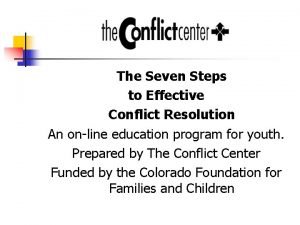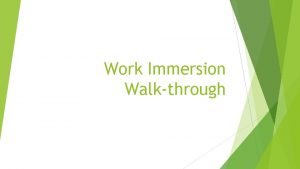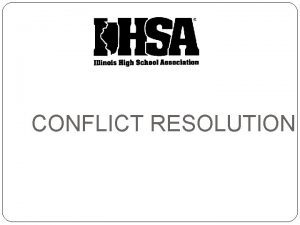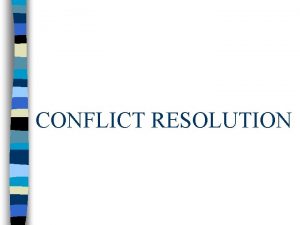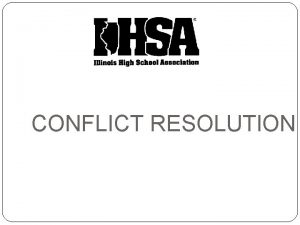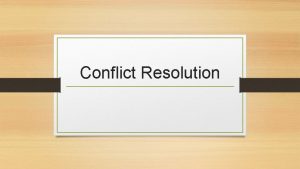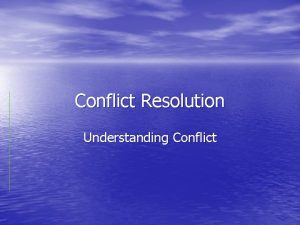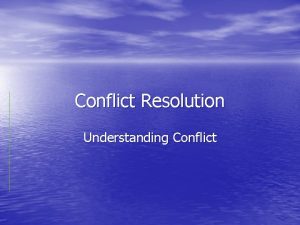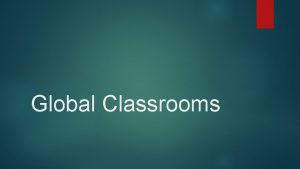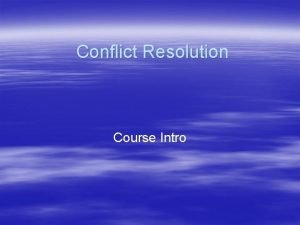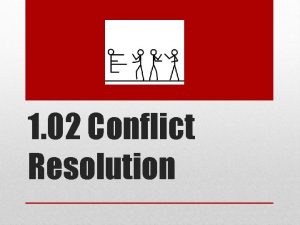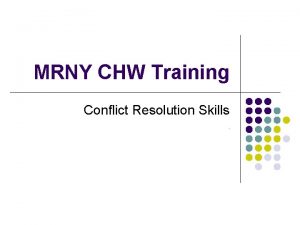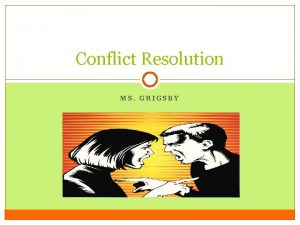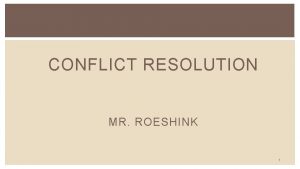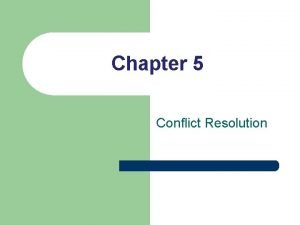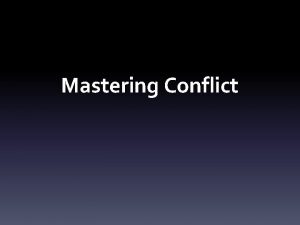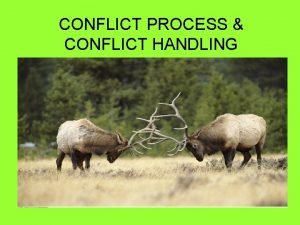Conflict Resolution in Americas Classrooms Equipping Americas Youth


















- Slides: 18

Conflict Resolution in America's Classrooms Equipping America's Youth with the Skills Necessary to be Responsible, Independent Decision Makers in Today's Complex Society

What is Conflict? • “Conflict can be defined as a difference between two or more persons or groups characterized by tension, emotionality, disagreement, and polarization when bonding is broken or completely lacking. ” - George Kohlrieser, Hostage at the Table • “To come into collision or disagreement; be contradictory, at variance, or in opposition; clash. ” - Dictionary. com • “a : competitive or opposing action of incompatibles : antagonistic state or action (as of divergent ideas, interests, or persons) b : mental struggle resulting from incompatible or opposing needs, drives, wishes, or external or internal demands” – Merriam Webster

Recognize Elements of Conflict Players Power Meaning Interests Skill/Intelligence Identity Diversity Experience Differences Viewpoints Resources Change Feelings Environment Values

What Does Conflict Look Like?

Develop a Strategy: Restorative Justice • Those affected by harm can work together to prevent , intervene and repair. This collaboration leads to true accountability. - Create safe spaces for people to express themselves - Promote connection, interdependency, healing - Be constantly present, attend to needs as they arise - Reintegrate, don’t perpetuate

What is Restorative Justice • A philosophy and approach that provides families, schools and communities a way to ensure accountability while breaking the cycle of retribution and violence - Misconduct is part of the developmental process of every young person - Corrective responses focus on teaching/training, not punishment (which leads to resentment, isolation and further disruption) - Accountability 1. Identify the harm 2. Involve all stakeholders 3. Repair the harm and address its causes

Elements of Restorative Justice • Voluntary participation • Respect for all involved • Inclusion of all impacted • Consensus-based decision making focused on repair and prevention • Opportunity for dialogue • Create and maintain a positive school culture and climate with an increased sense of belonging for all students and adults • Lifelong skill and familiarity in dealing with conflict

Implementation - What Does Restorative Justice Look Like? • Not a cookie-cutter - Each school community is its own culture, implementation of restorative justice must be tailored to the needs of your school • 3 -Tier Approach (Brenda Morrison, 2005) - School Wide Prevention Practices - Managing Difficulties - Intense Intervention

Tier 1 – School Wide Prevention Practices • Develop healthy relationships • Identify common values and guidelines • Develop social-emotional understanding and skills • Promote and strengthen sense of belonging and ownership • Positive reinforcement • Celebrate accomplishments • Value community, value relationships • Open lines of communication • Restorative Dialogue

Restorative Dialogue • Informal or formal conversations to repair or prevent harm utilizing active listening skills • Active Listening - Ability to hear and connect with another person to allow them to know they have been heard and understood, that their feelings are valid and provides a foundation to correct or clarify mistakes or misunderstandings - Summarize – restate the facts and reflect the feelings and needs associated with those feelings. - Open Ended Questioning – invites students to share their experience

Examples of Restorative Dialogue • • • Can you explain what happened? How did it happen? What was the harm? Who do you think was affected? How were they affected? How were you affected? What needs to happen now? What were you looking for when you chose to act? What would you like to do about it or offer and to whom? How should we make this right?

Tier 2 – Managing Difficulties • Peer Mediation - A safe, voluntary, accessible, confidential peer-run dialogue where students have the ability to share their stories, exchange ideas, gain greater understanding and potentially resolve their dispute • Restorative Circles - Making space in the classroom to resolve conflicts and solve problems - collectively Homeroom? Morning Attendance? Special Sessions?

Peer Mediation – the Process - Select the mediators - Provide a safe, comfortable setting for dispute resolution - Provide materials (peer mediation request, brainstorming worksheet, agreement to mediate, agreement form) - Opening Statements/Agreement to Mediate - Uninterrupted , equal time to share - Exchange/Discussion - Prioritize issues/set the agenda - Build the agreement/brainstorm ideas - Reach an agreement and wrap up

Tier 3 – Intense Intervention • Focuses on rebuilding relationships and repairing harm - Facilitated Dialogue Intervention Circles Peer Juries (focus on repair not punishment) Restorative Conferencing BE SMART FOLLOW UP!!! Specific steps to take; Measureability; Attainable results; Relevance to the harm and the root cause(s); Time to complete tasks and to realize results

Effects of Conflict Resolution in the Classroom • Cole Middle School, Oakland, CA - 30. 3% suspension rate pre-restorative justice, 10. 3% after (less than 20% suspended more than once compared to 60% previously) - Fiscally the school lost $9, 775 in daily attendance funding prerestorative justice, afterwards, $262 - CA State Test scores increased 74 points

Effects of Conflict Resolution in the Classroom (cont’d) • Pottstown High School, PA (874 students and rural) - Fighting cut in half after 2 nd and 3 rd years of training - Cafeteria violations cut in half - Sanctions such as timeouts and detention dropped from 168 in 2005/2006 to 37 in 2007/2008 – a 78% reduction

Conclusion • Conflict Resolution in the classroom has the ability to equip America’s youth with the skills necessary to be responsible, independent decision makers in today’s complex society; • It is needed. See today’s newspaper; See also today’s classroom • Restorative justice works; • While certainly not obligated, Vermont School Counselors, have the option to lead the country in this initiative; • Do you want to be a leader?

How to Bring Conflict Resolution to YOUR Classroom “Out there beyond the ideas of wrong doing and right doing there is a field. I will meet you there. ” – Rumi, Sufi Poet “Peace is not the absence of conflict but the ability to cope with it” – Author Unknown Contact Bryan or Maggie at conflictresolutioninclassrooms@gmail. com (802) 752 -7314 *Material for this presentation was generously provided by Jon Kidde, author of “Restorative Justice – A Working Guide for our Schools” and Joe Brummer, consultant.
 Chapter 21 equipping the kitchen
Chapter 21 equipping the kitchen What is conflict and conflict resolution?
What is conflict and conflict resolution? High resolution low resolution
High resolution low resolution Position paper global classrooms
Position paper global classrooms Thinking classroom peter liljedahl
Thinking classroom peter liljedahl Calmer classrooms
Calmer classrooms Building thinking classrooms
Building thinking classrooms Assistive technology in classrooms
Assistive technology in classrooms Inclusive chapter 1
Inclusive chapter 1 Peter liljedahl thinking classrooms
Peter liljedahl thinking classrooms Vocareum aws
Vocareum aws Peter liljedahl building thinking classrooms
Peter liljedahl building thinking classrooms Peter liljedahl building thinking classrooms
Peter liljedahl building thinking classrooms Horizontal rows in the classroom
Horizontal rows in the classroom Peter liljedahl thinking classrooms book
Peter liljedahl thinking classrooms book Bringing the universe to america's classrooms
Bringing the universe to america's classrooms Conflict management exercises
Conflict management exercises What are the 7 steps in conflict resolution?
What are the 7 steps in conflict resolution? Work ethics in work immersion
Work ethics in work immersion
